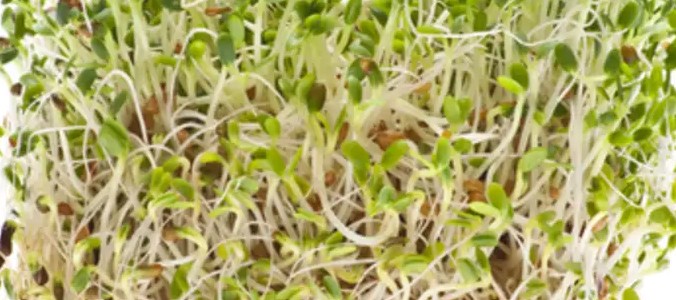-
 Turf Grass Seed Bluegrass, Bentgrass, Ryegrass, Fescues...
Turf Grass Seed Bluegrass, Bentgrass, Ryegrass, Fescues...
-
 Forage Seed Bromes, Clovers, Fescue, Wheatgrass, Legumes
Forage Seed Bromes, Clovers, Fescue, Wheatgrass, Legumes
-
 Grains Wheat Grain, Rye Grain
Grains Wheat Grain, Rye Grain
-
 Cover Crop Seed Buckwheat, Clover, Peas, Ryegrain
Cover Crop Seed Buckwheat, Clover, Peas, Ryegrain
-
 Wildflower Seed Mixtures, Singles, Annual, Perennial
Wildflower Seed Mixtures, Singles, Annual, Perennial
-
 Sprouting Seeds Fully certified Non-GMO Organic seeds for sprouts or microgreens
Sprouting Seeds Fully certified Non-GMO Organic seeds for sprouts or microgreens
Alfalfa Non-GMO Sprouting Seeds
Alfalfa Sprouts are one of the most well-loved and versatile sprouts available. They grow quickly and easily and two tablespoons will fill up a quart jar with this highly nutritional super food. Alfalfa sprouts have a mild flavor with a slightly nutty/crunchy texture. Excellent in salads, smoothies, sandwiches or simply eaten raw.
Seeding Rate:
Indoor: 2 Tbsp. / per 1 quart jar
Outdoor: 15-20 lbs./ per acre
How to Grow: Wash seeds and soak in lukewarm water overnight at room temperature. Place in jar covered with cheesecloth. Sprinkle with water 2-3x daily to keep seeds moist. (Rotating the jar after each sprinkling allows the sprouts to grow evenly). Ready to eat when 2.5” long (may become bitter if left to grow beyond 4” in length).
Note: For best results use non-chlorinated water. Keep room temperature between 70°F to 80°F and away from direct sun. Expect mature sprouts in 3 to 7 days. Wash in water bath to remove hulls (sprouts will sink to bottom, while the hulls float to the surface). Allow sprouts to drip drain. Sprouts are best when used immediately after washing them, but can be stored in sealed glass or plastic containers and refrigerated for up to a week.
Nutritional Value: Sprouting seeds are richer in protein, folate, magnesium, phosphorus, manganese and vitamins C and K than un-sprouted plants. The vitamin and mineral content varies based on the variety of the sprouting seeds. Sprouts offer a powerful source of vitamins, minerals, antioxidants, and enzymes that fight free radicals because sprouting can increase their potency by 20 times or more.

